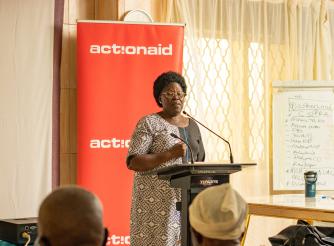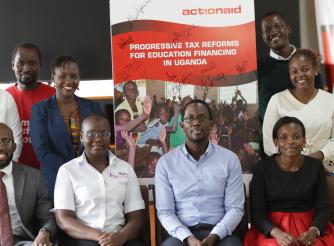Implementation of the Citizens’ actions for greater accountability and improved public service delivery.
by Joy Namunoga
In 1992, the government of the Republic of Uganda adopted the Local Government Decentralization policy to bring services such as education, health, and infrastructure development closer to people, and their management shifted to the Local Governments. Since the policy came into force, decentralization was never commensurate with the fiscal autonomy, as there are limited resources from the Central Government to the Local Governments (LG), witnessed by the ever-dwindling share of national budget by the LGs from 25.47% in FY 2003/2004 to 12.54% in FY 2018/19. Over 70.8% of the total allocations were earmarked for wages with only 14% for service delivery in FY 2018/19. The low funding has continuously portrayed LGs as consumptive and non-performing institutions. This insinuates that they don’t deliver on their promise on the decentralization strategy and are portrayed as non-productive; while CG Ministries are perceived as the strong implementer
Amidst this scenario, in September 2018, ActionAid International Uganda commenced the implementation citizens’ actions for greater accountability and improved public service delivery. One of the purposes of the project was to work with 18 Local Governments (LGs) to diversify revenue streams for improved gender responsive public service delivery. In collaboration with Uganda Local Government Association (ULGA), AAIU mapped and enhanced the capacity of 63 LG technical and political leaders in Local Economic Development (LED) as a mechanism for enhancing revenue collection and LG’s financial independence. Our training revealed that LGs were unable to tap into key revenue sources and had shortfalls worth USD 22,637,208 representing 17.6% of projected revenues. At the end of the training, we jointly developed a road map for addressing the challenges in alternative revenue diversification and collection.
Despite registering tangible milestones, 13 LGs lagged in this achievement. This prompted us to collaborate with the five best performing districts to conduct four regional refresher trainings in East, Northern, West Nile, and Central Uganda on alternative revenue collection and LED; conduct peer-to-peer support and sharing of experiences to motivate peers to strengthen revenue mobilization; and reset new revenue targets. AAIU spearheaded five LGs to conduct a revenue scoping study to identify opportunities for diversification and raising revenue to complement central government revenue. AAIU also conducted an exchange visit for 48 leaders from the 18 districts to the best performing districts to learn and appreciate their peers’ revenue mobilization work. This led to an additional two LGs to exceed their budget projections.
However, these efforts hit a snag when the Central Government through the Ministry of Finance Planning and Economic Development (MoFPED) commenced collecting surplus revenue collected and taking it back to the consolidated fund rather than leaving it for utilization by the respective LGs.
In partnership with ULGA, two press conferences were held to share LG grievances on Uganda’s model of decentralization and how the public Financial Management Act of 2015 impeded fiscal decentralization. We jointly advocated for the establishment of the Local Government Sector which was approved by cabinet and became operational in the FY 2019/2020 under the stewardship of the Ministry of Local Government (MoLG). The sector’s main key role is to improve coordination, structuring and financing of decentralized services. To date, 63 LGs are using the platform to lobby MoFPED, Parliament and MoLG to review the law on fiscal decentralization as it impedes implementation of local revenue. The decentralization policy strength and success lie in CG progressively increasing LG funding to a minimum of 38% of the national budget with significant funds invested in the major social services that touch the wellbeing and productivity of the rural communities.


